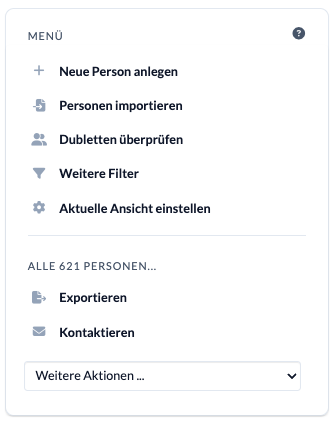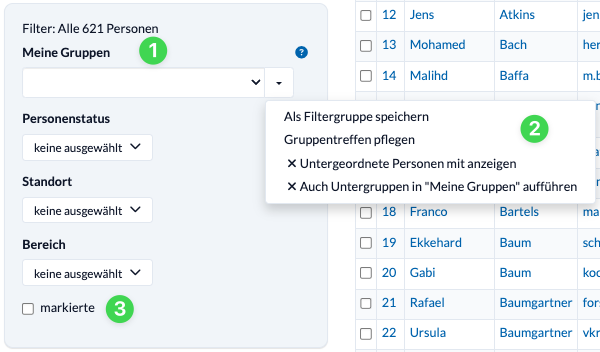Churches, congregations and other ministries are all about people – individuals and people who experience, move, serve, etc. together.
The People module is in some ways the heart of your ChurchTools and the basis for most of the other modules.
This is where the information about the people in your congregation is managed.
- This includes standard information such as addresses, contact details, date of birth, person status (e.g. member or friend), family relationships, etc.
- You can add a photo and display the address on a map.
- You can store data protection information for each person and even attach files to a person (e.g. a scan of a signed declaration).
- You can link people to each other with relationships.
Tutorial – First steps #
Overview of the module #
Module areas #
If you call up the module, you will first find yourself in the People area. If you want to edit something else in the module, select the desired area via the second menu level of the module.
- Persons (1) lists all individual persons. Here you can view, search, filter, edit etc. persons.
- Under Groups (2) you will find all the groups in your congregation. You can find more information on working with groups in the help pages for our new Groups module.
- In the E-mails section (3), you can send e-mails to other users of your ChurchTools and find the e-mails you have sent. If you have the appropriate permission, you can also manage your templates here.
- Under Bulk letters (4) you will find all the bulk letters you have created, you can create new ones and manage the templates.
- Under Master data (5), administrators can manage the module’s master data and manage existing personal data fields and create new ones.

Personal area #
Menu
Depending on what you are authorized for, you will see the following options in the menu on the left-hand side of the module:
- Create new person
You can create a new person here. You will first be asked for some basic data. You can enter more data after creating the person. - Import people
With the person import you can import all data that you have digitally and is directly related to persons and their properties into your ChurchTools. - Check duplicates
Here you can check all the personal data stored in your ChurchTools for identical or similar entries. ChurchTools will show you similar records and you can decide whether they are duplicates or not, compare them and merge them automatically. A user who is to check the duplicates needs the global rights “administer persons” and “edit relations”. This user must also be able to see all security levels.
- Further filters
Here you can filter people based on the data stored. The types of filters are:- personal information (e.g. date of birth, place of residence, etc.)
- Group affiliation (e.g. “Who is in a small group?”, “Who was at the church camp?”)
- Relationships (e.g. who is married? Who has children?)
- Roles at events.
- Set current view
Here you can customize your current view with a few basic settings.
- Export
With the appropriate permission, you can export information to a CSV file here. You can of course specify exactly which fields are to be output. - Contact
Here you can write to all or selected people by e-mail directly from ChurchTools or via your own e-mail program. You can also create a form letter or just address labels here. - Bulk actions
You can use the Bulk actions to edit all or any number of people at once. You can see the list of options when you open the selection field.

My todos
This filter is displayed below the menu if there are tasks that are assigned to you, e.g. contacting people in your groups, checking registrations for a seminar, etc. If there are no tasks, this element is not displayed.

Filter
You will also find some helpful preset filters on the left-hand side below the menu, which you can apply to selected people in your list using the checkbox next to marked (3).
- My groups (1): This shows you all the people from the groups you are a member of. You can also call up filter groups you have created yourself here. Filter groups are more complex filters with several elements that you can save as a filter group using the small arrow to the right of the selection field (2).
- Person status: Here you can quickly display only “Friends” or only “Members”. Multiple selection is also possible.
- Campus: If your congregation has several campuses, you can set a filter here and display all people from just one campus.
- Department: You can use this filter option to hide and show different work departments. This filter is only displayed if several departments are defined for your ChurchTools.

List selection
The central element of the people area is the List of people list. The list is displayed by default as soon as you open the People area. You also have the option to switch to other views and lists.
- List of people (1)
The persons are listed here – depending on the filter settings.
In the columns you will see the checkbox, list number, first name and surname, e-mail or telephone number, membership of groups and the abbreviations P (= person status), C (= campus) and D (= department) if more than one is defined. You can customize your display below the list. - Map view (2)
All filtered persons are displayed on an OpenStreet-Maps map. - Statistics (3)
Data from the filtered persons are analyzed in various ways. - Archive (4)
People can be moved to an archive. They will then no longer have an active account and therefore no longer have access to your ChurchTools. They will be displayed in this list. You can find more information on this on our help page for the personal archive

Search
The search field (5) looks simple, but has some extensive functions:
Partial search of text elements in the following personal data fields:
- First name
- Surname
- Mobile phone number
For example, you can also enter “erner Schmitt” or “mitt” for “Werner Schmitt”.
Exact search in the following personal data fields
- Nickname
- E-mail address
- User name
- Tags
- ID in ChurchTools
If you search for the e-mail address “werner.schmitt@xyz.de”, it will only be found with “wern” but not with “erner.schmitt”. This also applies if you want to search for an e-mail provider: Searching for “@xyz.de” will not return any results.
Partial search for texts in group remarks:
All information in group comments that you are allowed to see is also searchable. For example, a comment says that someone is a “professor of art”. So if you search for “professor”, the person in question will be displayed.
Further search options
- If you enter TAG:, all tags will be listed and you can click on one to filter by it.
- If you search for house groups, for example, you will get a list of all groups with this name in the search field. Clicking on a specific house group then filters the people who are in this house group.
- A search with the content group: “house” also finds all groups that contain the term “house” somewhere, e.g. also the group “Head of housekeeping” .
- The terms can also be combined, e.g. a search for group: “House” Schmidt. This will display all people called “Schmidt” who are in any group containing the word “house”.
Categorizations in ChurchTools #
The more people you have in your ChurchTools, the more important it is to clearly categorize and structure them. Below you will find a summary of the possible categorizations that you can use.
- Person status – A person has exactly one status that describes their community affiliation. Person statuses are, for example, member, friend, to delete, …
- Campus – A person has exactly one campus to which they belong within your congregation, e.g. Campus – center, Campus – South …
- Department – This is a sub-area or branch of work within your congregation. Examples: Entire congregation, youth work, children’s ministry. A person must be assigned to at least one department, but can also belong to several departments.
Filter and sort your data #
- Filter – You can use filters to narrow down the list of people.
- Filter groups – If you have set up a complex filter with several elements, you can save it as a filter group, e.g. “All married parents with children who are not yet in a small group”.
- Tags – Tags are keywords that can be assigned to persons, groups or songs and that you can filter or search for (e.g. “guitarist” so that all guitarists are automatically suggested when planning a service).
- My tasks – filter for leaders with specific tasks (e.g. checking registrations for seminars, etc.)
